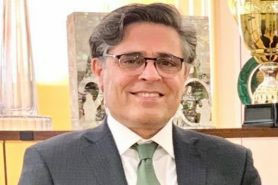Srinagar
Pakistan told the UN Human Rights Council that India was using the severe restrictions it imposed on communications in Jammu and Kashmir as a “policy tool” to hide its illegal actions and continued human rights atrocities in the disputed region.
“Today Indian occupied Kashmir represents a classic case where the self-professed largest democracy has defiantly violated longstanding principles of international law, norms and responsible state behaviour,” Ambassador Khalil Hashmi said during an interactive debate in the Geneva-based, 47-member Council.
The Council was debating a report of UN Special Rapporteur on contemporary forms of racism, racial discrimination, xenophobia and related intolerance. E. Tendayi Achiume presented her report on the thematic issue of racial discrimination and emerging digital technologies: a human rights analysis.
“The new xenophobic political discourse and ideologically motivated hate speech is being practiced in the garb of patriotism, inciting religious and racial hatred, increasingly through social media platforms,” the Pakistani envoy said, while pointing to the stepped up targeting and stigmatizing of Muslims in India since 2014 when Prime Minister Narendra Modi was first elected. “BJP (Bharatiya Janata Party) leaders have since stoked contemporary forms of racism, Islamophobia and intolerance, first as part of its electoral strategy, and implemented later as State policy,” he said, adding that they have openly incited violent attacks against Muslims and other minorities with political protection, approval but without any accountability. “Mobs affiliated with the BJP have, since 2015, killed and injured scores of members of religious minorities amid rumours that they traded or killed cows for beef,” Ambassador Hashmi said.
“As also noted by the Special Rapporteur, social Media Platforms such as Facebook have been used to amplify discriminatory and intolerant content, including content inciting violence against religious and linguistic minority groups in India. “Such divisive forces pose a grave threat to our shared objectives of respect for and realization of human rights for all, without discrimination,” he said, adding that their state sanctioned incendiary rhetoric and complicity has the potential to also threaten regional and international peace and security.—KMS










